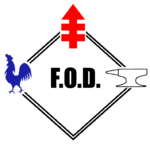Confederation of Democracy
Confederation of Democracy Confederación de la Democracia | |
|---|---|
 | |
| Leader |
Eduardo Frei Montalva Sergio Onofre Jarpa |
| Founded | July 6, 1972 |
| Dissolved | May 20, 1973 |
| Headquarters | Santiago |
| Political position | Centre-right |
| Colours | Blue |
The Confederation of Democracy (Spanish: Confederación de la Democracia, CODE) was an electoral alliance of center-right Chilean political parties formed in July 1972. Its main purpose was to unite all the opposition parties of the Popular Unity government to face the parliamentary elections on March 1973. Its main objective was to optimize the collection of votes and seats, and accomplish the majority of Congress and thus obtain at least two thirds of the deputies.
History
There were two opposing views between the parties who were against Allende's government. On one hand, the National Party (PN) and the Radical Democracy Party (DR) who saw it as a way of defeating the UP parties. The Christian Democratic Party (PDC), along with the Radical Left Party (PIR) and the National Democratic Party (PADENA), saw in the coalition a way to control the UP within the legal framework.[1]
On June 9, 1972 the Electoral Court allowed the creation of electoral coalitions (or federated or confederated parties according to the law) in the elections of the National Congress of March 1973. This sentence repealed a 1962 ruling banning pacts, who were allowed only in the senators elections since 1960.
His first action, albeit unofficial, was in the by-elections of January 1972, in which the CODE defeated the UP and rescue a congressman and a senator.


This coalition consisted of two federations of parties:
- The Federation of the Democratic Opposition (FOD, Federación de Oposición Democrática) composed of the PDC, PIR and PADENA.
- The National-Radical Democracy Federation (FNDR, Federación Nacional-Democracia Radical) composed of the National Party and Radical Democracy Party.
According to the results in the parliamentary elections of 1973 the CODE won the majority of the Chamber of Deputies, but did not obtain a two-thirds majority (100 deputies) that would have allowed him to block any constitutional reform and conduct an impeachment against President Allende. This last point was the objective of CODE.
After installing the new National Congress the CODE was dissolved, as said in their founding statute, which formally stated May 20, 1973 as the date of the formal dissolution.[2] However, the Electoral Register legally dissolved the CODE on July 5.[3] On August 8 the National-Radical Democracy Federation was also dissolved.[4]
Program
The CODE's goals and program have been based on:[5]
- Liberty and labor rights
- Better freedom of speech and information
- Change of the Chilean Constitution
- Ending of the political violence and law and order policies
- Normalization of the political situation.
Composition
Electoral results
| Chamber of Deputies | |||||
| Election year | # of overall votes |
% of overall vote |
# of overall seats won |
+/– | |
|---|---|---|---|---|---|
| 1973 | 2,013,592 (#1) | 55.49 | 87 / 150 |
| |
| Senate | |||||
| Election year | # of overall votes |
% of overall vote |
# of overall seats won |
+/– | |
|---|---|---|---|---|---|
| 1973 | 1,259,343 (#1) | 57.25 | 14 / 25 |
| |
References
- ↑ Friedmann, Reinhard (1988). La política chilena de la A a la Z. 1964-1988 (in Spanish). Santiago de Chile: Editorial Melquíades.
- ↑ Library of the Chilean National Congress. "Confederación de la democracia". Historia Política Legislativa (in Spanish). Retrieved November 2, 2013.
- ↑ "Cancela la inscripción de la Confederación de la Democracia" (PDF). Diario Oficial de la República de Chile (in Spanish). 6 July 1972.
- ↑ "Cancela inscripción de Federación Nacional-Democracia Radical" (PDF). Diario Oficial de la República de Chile (in Spanish). 10 August 1972.
- ↑ Friedmann, Reinhard (1988). La política chilena de la A a la Z. 1964-1988 (in Spanish). Editorial Melquíades.